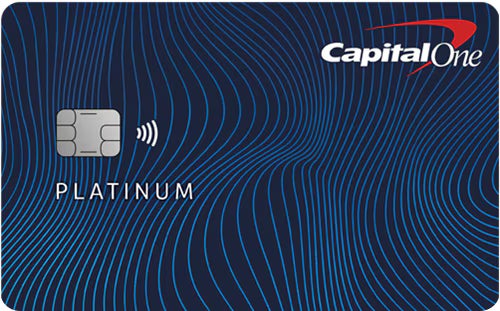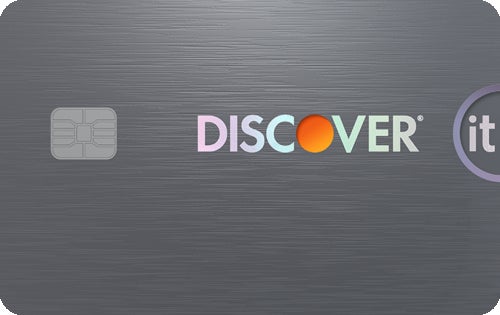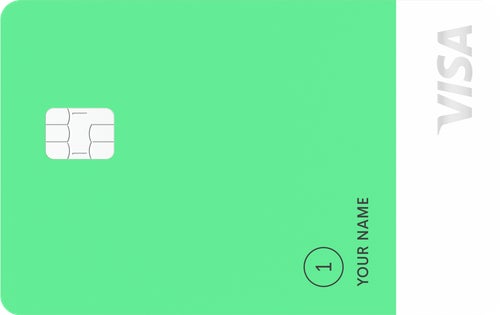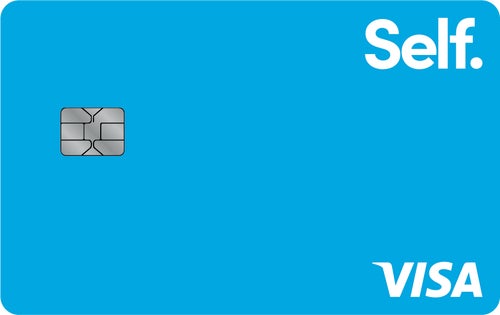| Credit Building Rating: | 3.0 / 5 |
| Cost of Membership | 2.0 |
| Ease of Building Credit | 3.0 |
| APR | 2.0 |
| Features | 3.8 |
In a Nutshell:
This secured card carries a low deposit requirement, a relatively low annual fee and a chance at an unsecured credit limit increase, so it’s a solid — if basic — starter card for building credit.
Security Deposit Required $100 minimum |  |
Initial Credit Limit Equal to your deposit |  |
Access To Higher Credit Line? You have a chance at an unsecured credit limit increase after six months with responsible card use. |  |
APR 27.49% APR Variable |  |
Annual Fee $0 annual fee first year, $25 annual fee thereafter. Variable APR of 27.49%. Offer valid for new customers only. |  |
Other Rates and Fees
|  |
Rewards None |  |
Other notable features: No credit check required, chance at unsecured credit limit increase with responsible use
Building credit may seem impossible when you’re first starting out, and it can be especially frustrating if you’re having trouble getting approved for the credit cards you really want. But with the right financial product, you can build credit with no credit history or repair bad credit over time.
Secured credit cards are among the most popular credit-building card options, offering a low entry barrier and often charging no annual fee. The main drawback is you have to tie up money in a security deposit as you prove your creditworthiness. While you can get your deposit back when you close your account or upgrade your card, this can be a roadblock if you’re short on cash.
The secured Self Visa® Credit Card simplifies this process by requiring no credit check and allowing you to get started with a security deposit as low as $100. You’ll even have a chance to get an unsecured credit limit increase after six months of responsible card use.
The catch? It charges an annual fee after the first year. While that’s low, plenty of other secured cards charge no annual fee. Some cards even earn cash back while charging no annual fee or offer an upgrade path to even more lucrative rewards cards.
So while this credit-building combination could be helpful if you don’t have much money to set aside for a deposit, the secured Self Visa will have limited long-term value compared to many alternatives.
Why you might want the secured Self Visa Credit Card
The secured Self Visa Credit Card offers credit-builders a great starting point since it carries a low deposit requirement and doesn’t require a credit check. Even it’s ongoing annual fee is fairly low.
No credit check required
You can qualify for the secured Self Visa card with no credit history and without a hard inquiry on your credit report. Indeed, you won’t face a credit check of any kind, making this card easily one of our top “soft pull” credit card picks.
If you’re eager to avoid the credit score ding that comes with applying for a card, there aren’t many options as good as the Self card available with a low credit score.
Low starting deposit requirement
Many secured credit cards require a security deposit of around $200 to $500 just to get started, which can be a dealbreaker if you’d rather not tie up a ton of money for months while you work on your credit score.
The secured Self Visa lets put down just $100 to start — one of the lowest security deposits we’ve seen, especially on a card with no credit check required. This means you may be able to start working toward a credit card right away instead of having to build up savings first.
Increase your credit limit over time
While your initial credit limit can be as low as $100 (matching your deposit), you have a chance to get an unsecured credit limit increase after just six months of responsible card use (which should include making your payments on time and avoiding maxing out your cards).
Why you might want a different card
If you’re looking for a way to boost your credit score and build credit history, the secured Self Visa card may be exactly what you need. But if you want a card with low rates, no fees or lots of perks and rewards, this isn’t the one for you.
Annual fee after the first year
Though the secured Self Visa card charges a $0 annual fee for the first year, you’ll face a $25 annual fee thereafter.
While that’s a relatively low fee for a credit-building card, plenty of competing secured cards charge no annual fee at all. In fact, a few unsecured cards available with fair credit only charge a slightly higher fee.
For example, the Capital One QuicksilverOne Cash Rewards Credit Card not only charges an annual fee of just $39, but also earns 1.5% cash back on every purchase. With that rate, a $2,600 spend would earn you enough cash back to offset the QuicksilverOne card’s annual fee, potentially making it a better deal overall.
No rewards
As mentioned, a handful of credit-building cards — cards available with bad or fair credit — earn rewards, including not only the QuicksilverOne, but also some no-annual-fee secured cards like the Discover it® Secured Credit Card (which offers 2% cash back at gas stations and restaurants on up to $1,000 in combined purchases each quarter, automatically).
You’ll need to spend money on everyday purchases like groceries and gas regardless of where you’re at in your credit-building journey, so there’s no real downside to having a card that both earns rewards on those purchases and gives you a chance to work on your score.
With no rewards and no upgrade path to a quality rewards card, the secured Self Visa has limited long-term value once you’ve improved your score.
How does the secured Self Visa card compare to other credit-building options?
While the secured Self Visa could make sense as a short-erm, relatively low-cost credit-building option, it’s far from your lowest-cost or most-rewarding credit-building option.
Other secured cards can help you earn rewards and build your score without paying an annual fee, while also giving better options when it comes time to “graduate” from a secured to an unsecured card.
Alternatively, you could opt for a low-cost unsecured card for building credit and avoid a security deposit entirely. Some unsecured credit-building cards also earn rewards, which may make a higher fee worth it. Here are a few cards worth considering:
 Capital One Platinum Secured Credit Card
|  Discover it® Secured Credit Card
|  |
Rewards rate
| Rewards rate
| Rewards rate
|
| Credit limit See terms | Credit limit See terms | Credit limit $300-$5,000 |
| Annual fee $0 | Annual fee $0 | Annual fee $0 |
Other things to know
| Other things to know
| Other things to know
|
Capital One Platinum Secured Credit Card
Though it’s a secured card, the Capital One Platinum Secured Credit Card offers an exceptionally low entry barrier. You can put down as little as $49 as a refundable deposit and still get a $200 credit limit, making this almost a hybrid secured-unsecured credit-building option. The Capital One Platinum Secured Credit Card also charges no annual fees and gives you a chance to upgrade to a higher credit line after you make your first six payments on time.
Discover it® Secured Credit Card
Easily one of the most generous credit-building cards out there, the Discover it® Secured Credit Card not only charges no annual fee but also features a generous cash back rewards program and welcome bonus offer that matches all the cash back you’ve earned at the end of your first year. This means you can actually earn rewards as you work on your credit. On top of this, the card features a credit limit of up to $2,500 (equal to your deposit), has automatic reviews starting at seven months to see if you can transition to an unsecured line of credit and have your deposit returned, and will waive the fee the first time you pay late (up to $41 after that), all of which should be especially appealing to someone new to credit.
Petal® 1 “No Annual Fee” Visa® Credit Card
The Petal 1 card is a terrific option for credit-builders since it’s available even with limited credit history, charges no annual fee and offers a minimum starting credit limit of $300. The card is also notable for its flexible approvals process: The issuer can consider more than just your credit score when you apply and may take into account other financial data like your bill payment history. This will be a big help if you’ve had some credit missteps in the past but are otherwise on solid financial ground.
Is the secured Self Visa card right for you?
The secured Self Visa card is a simple, relatively-low cost credit-building option with a low deposit requirement and no credit check required, making it a solid option if you’re looking to avoid dining your credit score with a hard pull and want to tie up as little money as possible while you work on your score.
But it’s far from your most cost-effective option.
Many secured credit cards let you accomplish the same goal of building credit without any required fees or charges, and some require as little as $50 as a deposit to get started. Some secured credit cards even let you earn rewards on your spending, which — even if they charge a higher annual fee than the secured Self Visa — can offer better long-term value.
Our verdict: Most credit builders will be better off opting for a no-annual-fee secured card or a credit-building card from a major issuer that earns rewards. Those should come at a lower cost, offer a better upgrade path and long-term value, or all three.
*The secured Self Visa® Credit Card is issued by Lead Bank, Sunrise Bank, N.A., or First Century Bank, N.A., each Member FDIC.
All reviews are prepared by CreditCards.com staff. Opinions expressed therein are solely those of the reviewer and have not been reviewed or approved by any advertiser. The information, including card rates and fees, presented in the review is accurate as of the date of the review. Check the data at the top of this page and the bank’s website for the most current information.
Responses to comments in the discussion section below are not provided, reviewed, approved, endorsed or commissioned by our financial partners. It is not our partner’s responsibility to ensure all posts or questions are answered.
Partner Offer
